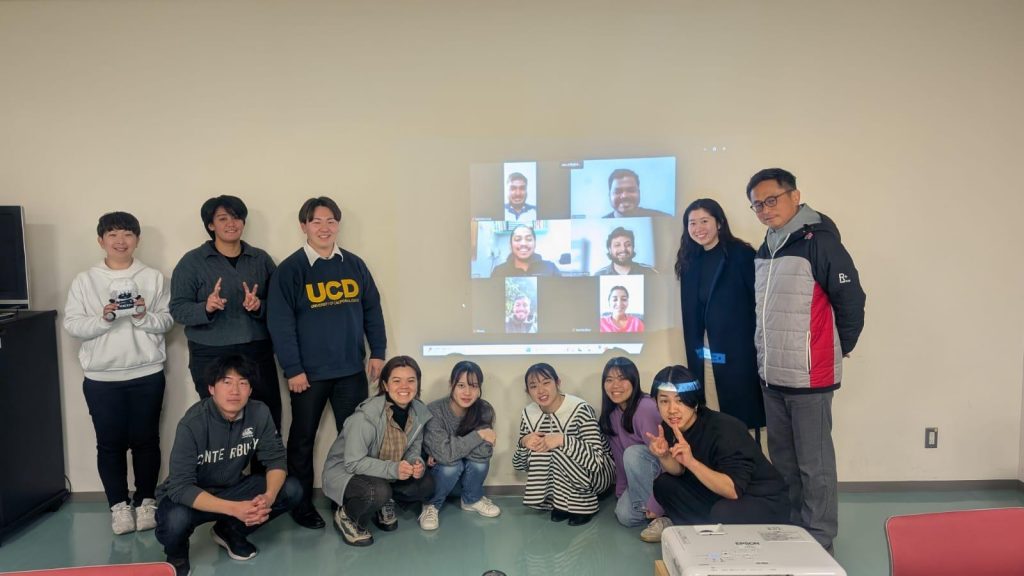
Youth Leadership Development Program “RUCK’ed” Report
1. Online Sessions
Tackling Environmental Issues through Rugby
The first three online sessions of the RUCK’ed (Rugby Uniting Changemakers for Knowledge, Empowerment, and Development) program were held on January 5, 15, and 22.

About RUCK’ed
This program is conducted by the Japan Rugby Football Union (JRFU) with collaboration with Rugby Association of Maharashtra. For JRFU, this is also as a part of “Asian Scrum Project,” which started in 2011 as the legacy program for Rugby World Cup 2019.. It is also aligned with the “Environmental Sustainability Promotion Declaration” announced in October of this year.
RUCK’ed aims to provide youth with opportunities to tackle environmental issues through rugby, develop international leadership and management skills, and implement activities within their communities to contribute to solving social challenges through sports.
This year, 16 participants from Japan and India (eight from each country, four men and four women) were selected to join the program. The program consists of three parts: pre-departure lectures, activities in India, and post-program individual projects. The pre-departure phase includes online and weekend in-person sessions focusing on leadership, management, sports, and sustainability. The India phase, scheduled for early February, involves a one-week visit to India, where participants will observe environmental NGOs and organize the Green 7’s Cup, a sustainable rugby sevens tournament. Finally, participants will implement individual projects upon returning to their respective countries.
This report covers the three online sessions.
Session 1: Kickoff Session
The first session began with introductions from JRFU, the Rugby Association of Maharashtra, and the facilitating organization, ComMutiny – The Youth Collective. Participants introduced themselves and shared their motivations for joining RUCK’ed and their areas of interest in social issues.
The session covered the project’s objectives, schedule, and an introduction to JRFU’s “Asian Scrum Project.” Additionally, five house rules were shared to ensure a safe and inclusive environment for participants from diverse backgrounds and languages.
Despite some initial nervousness, the session allowed participants to get to know each other in an engaging and enjoyable way.
Session 2: Leadership and Management
The second session focused on leadership and management.
What is Leadership?
Lecturer: Rajesh Nandan Singh Meher (Chief Operating Officer – ComMutiny)
Mr. Rajesh Nandan Singh Meher from ComMutiny – The Youth Collective, which develops youth programs in India, led a discussion-based lecture on leadership. Participants explored the qualities of an ideal leader, the role of leadership in action, and the idea that “A leader is not a noun but a verb,” emphasizing the importance of taking initiative.
Leadership vs Management
Lecturer: Saif Ullah Khan (Partnership, Marketing & Social Impact Program – Rugby Association of Maharashtra)
In the second half, the session focused on the differences between leadership and management, introducing the method of self exploration “TATVA,” a Hindi term meaning “elements.”
Participants learned it is important to learn about theirself to take actions for the society. This framework helped participants to learn their own value, way of thinking and how to react to certain situations. Through case studies, participants discussed various scenarios, analyzing them from both leadership and management perspectives.
Participant Feedback:
“The idea that a leader is a verb rather than a noun was particularly striking.”
“I gained a new perspective on what makes a good leader. The TATVA framework will be useful not only in my personal life but also in my work.”
“TATVA as a self-analysis tool was impressive.”
Session 3: Sport for Development & Sport and Sustainability
The third session focused on the role of sports in social development and sustainability. The session featured a program staff member and three guest speakers from World Rugby and the environmental sectors in Japan and India.
Sport for Development
Lecturer: Mai Sakaguchi (International Cooperation Officer, Rugby Development, JRFU)
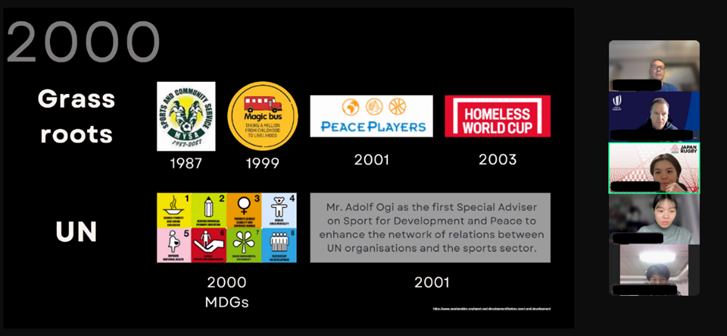
As participants prepared for the Green 7’s Cup, this session provided an introduction to Sport for Development, the history of this field, key stakeholders, and the differences between “sports development” and “sports for development.” The discussion emphasized on having “ the right intention” by understanding social issues and identifying scope on how to utilize sports as a tool for addressing them.
Climate Change in India and Japan
Lecturers:
Pooja R Bhale (Spiritual Ecologist and Environmental Educator, PROTECTERRA Ecological Foundation)
Ayako Takao (Climate Advocate/Climate Youth Japan/ International Christian University BA Student)
Ms. Bhale and Ms. Takao provided insights into climate change in India and Japan, highlighting how different countries have unique strategies and actions. Despite varying approaches, the session reinforced that climate change is a shared global issue requiring urgent attention.
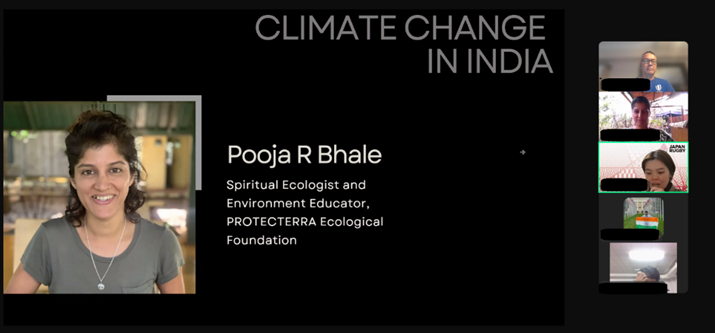
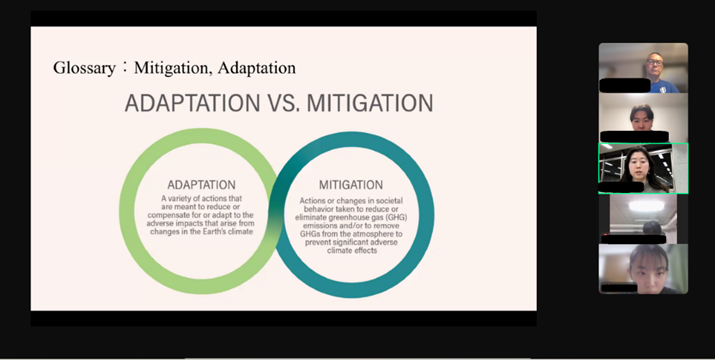
World Rugby & Sustainability
Lecturer: Jaime McKeown (Sustainability, Diversity, and Inclusion Manager, World Rugby)
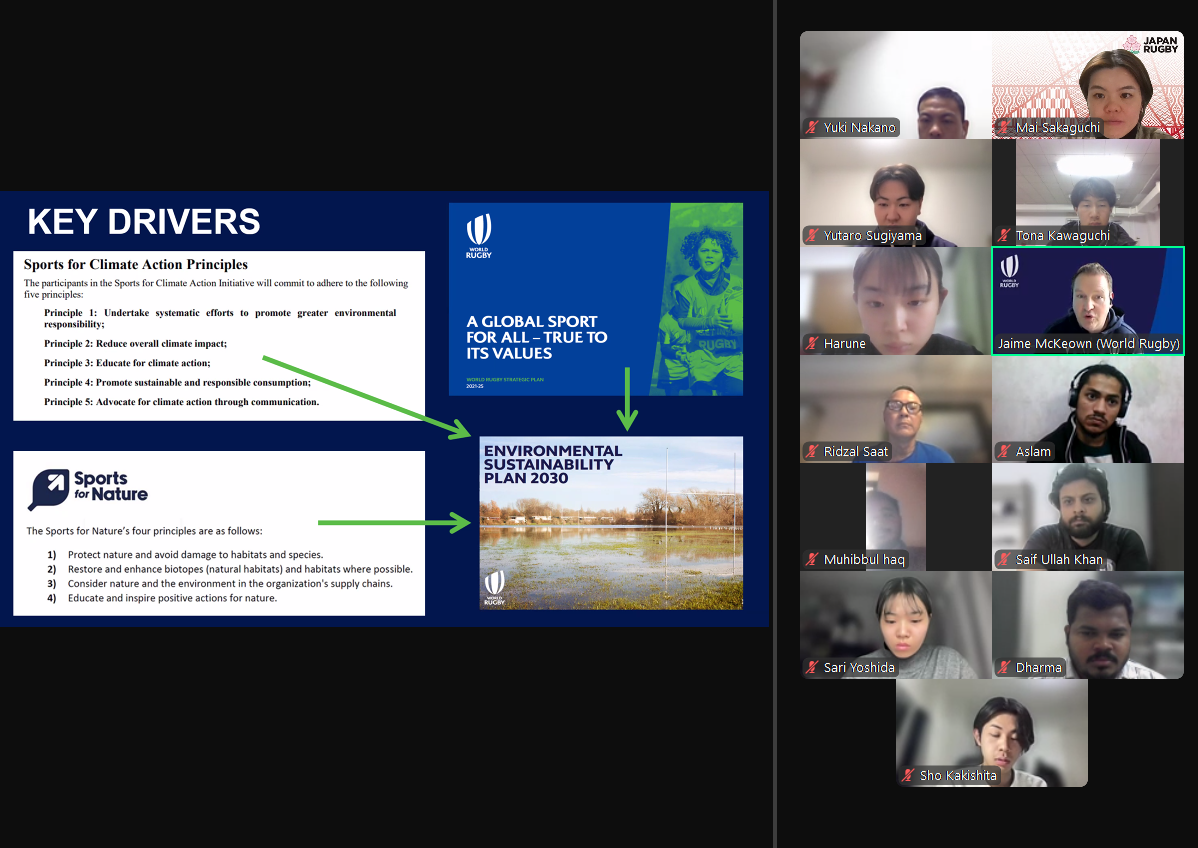
Mr. McKeown presented World Rugby’s Environmental Sustainability Plan 2030, discussing how climate change-related disasters such as floods and rising sea levels impact rugby. The session concluded with the powerful message: “The best time to act was yesterday; the next best time is now.”
Following these discussions, participants brainstormed ideas for the Green 7’s Cup, dividing into two groups: “Communication & Public Relations” and “Sustainability Activation.” They will take on key roles in running the event.
This session provided an opportunity to learn not only about rugby but also about environmental issues in Japan and India through engaging discussions with experts.
Participant Feedback:
“Understanding adaptation, mitigation, and World Rugby’s sustainability plans helped shape my approach to future projects.”
“I realized how rugby is already contributing to solving social issues. Compassion is crucial in tackling these challenges.”
“Global warming is a serious issue requiring immediate action. Learning about World Rugby’s sustainability efforts was reassuring.”
Next Steps
Following their trip to India, the final program will be held in a hybrid format, with Japanese participants meeting in person while Indian participants join online.
Stay tuned for more updates on RUCK’ed!
2. Team Building
Addressing Environmental Issues through Rugby
On January 26, the fourth session of RUCK’ed (Rugby Uniting Changemakers for Knowledge, Empowerment, and Development) was held. The session was conducted in a hybrid format, with Japanese participants attending in person and Indian participants joining online. On January 25, participants engaged in the management of FOR ALL Mini Rugby Friendly Match, while on January 26, they attended lectures and participated in group work.
Session 4-1: FOR ALL Mini Rugby Friendly Event Operation
Since some participants in this program had no prior rugby experience, the Japanese participants took part in the management of the “FOR ALL Mini Rugby Friendly Match” at Ecopa Stadium in Fukuroi City, Shizuoka Prefecture, on January 25 to learn the game operation of rugby. This served as a preparation for organizing the Green 7’s Cup in India. Participants experienced a variety of roles, including announcements, field operation, and emergency medical response.
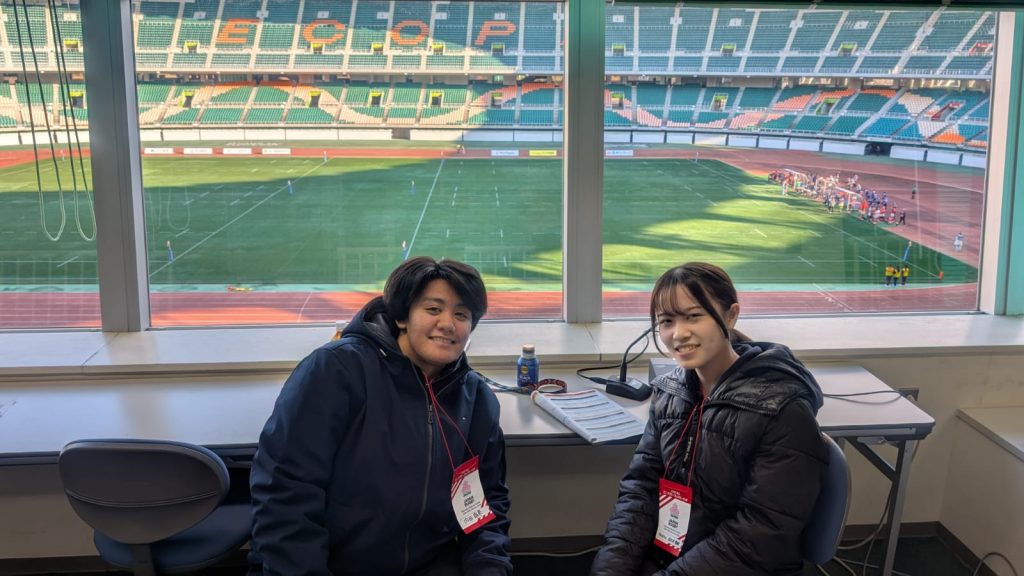
After the match, participants reflected on the first three sessions and shared their self-analysis results using the “TATVA” framework.
Session 4-2: Sport and Sustainability
On January 26, the program was conducted with Japanese participants in the morning and a hybrid session with Indian participants in the afternoon. This session included team-building activities and lectures from two guest speakers.
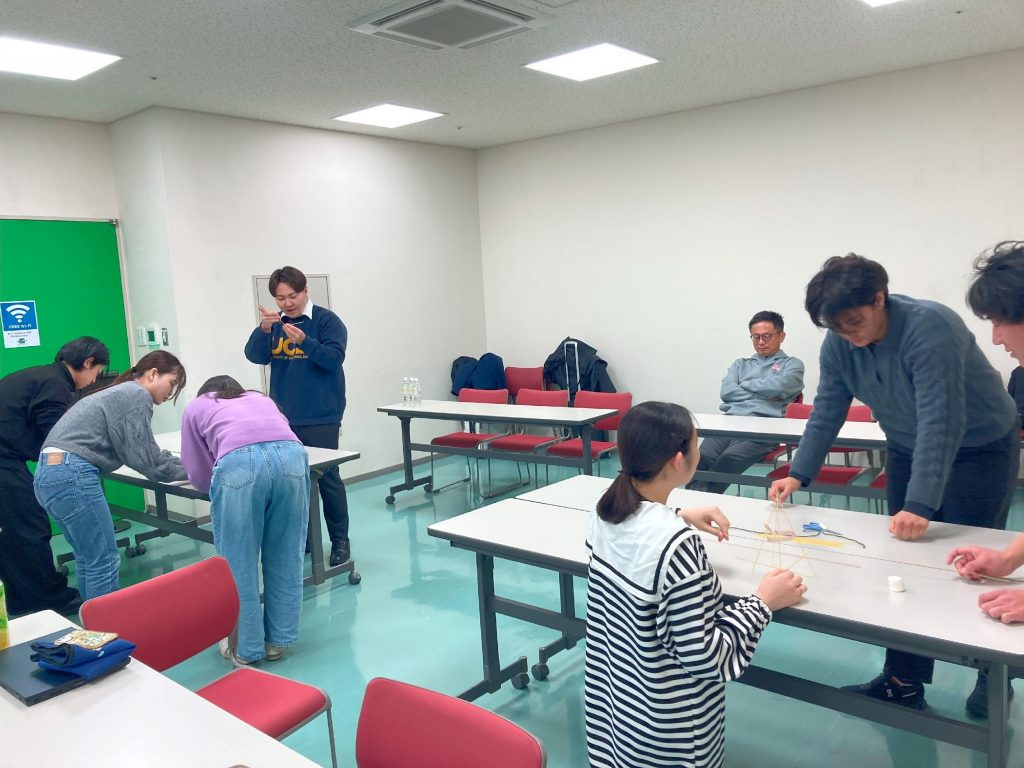
Voice of Youth
Lecturer: Ayako Takao (Climate Advocate/Climate Youth Japan/ International Christian University BA Student)
Following her lecture in the third session, Ms. Takao once again served as a speaker, providing insights into climate change and youth activism. Participants learned about the mindset required to represent youth in international forums and gained a deeper understanding of global environmental issues.
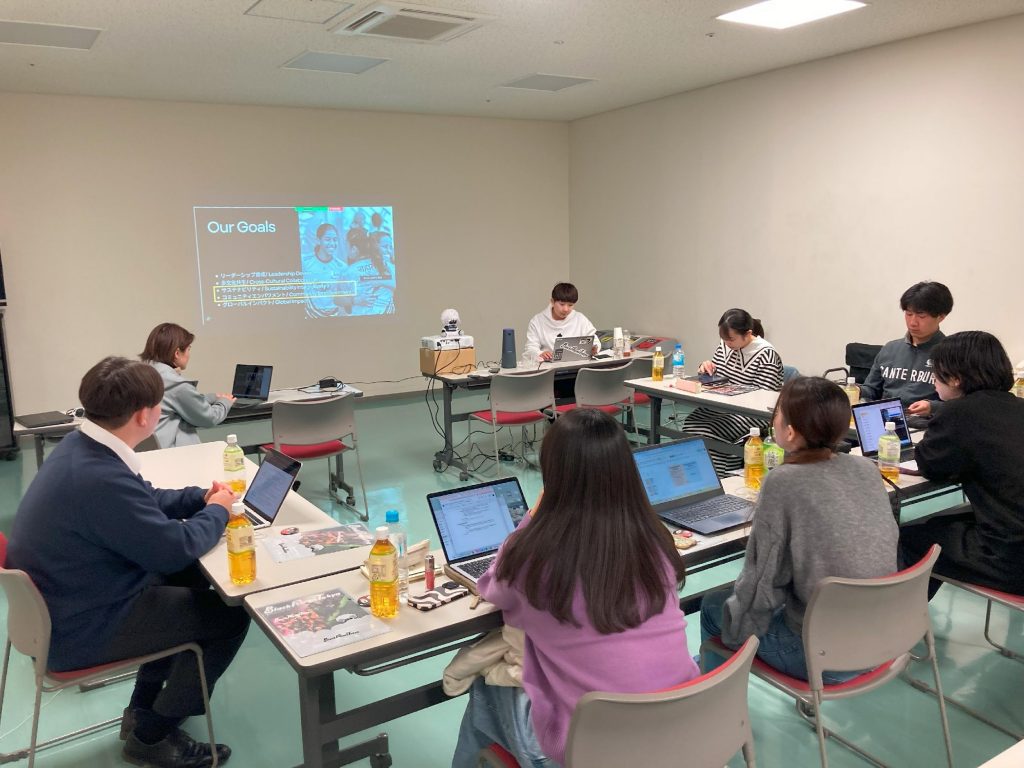
Activation in League One Team
Lecturer: Asako Noda (Public Relations Representative, RICOH BlackRams Tokyo)
Ms. Noda introduced the environmental initiatives undertaken by RICOH BlackRams Tokyo through rugby. Under their vision “Be a Movement,” the team actively engages with their community to address environmental and social issues. Participants learned how to create impactful actions to contribute to societal challenges.
Through these discussions on sustainability, community engagement, and various environmental initiatives, participants gained valuable insights that will inform their future efforts.
Activation Sharing & Feedback Session
The final session before the trip to India focused on brainstorming ideas for activities to be conducted during the Green 7’s Cup. Participants split into two groups: one focusing on public relations and promotions and the other on sustainability activations. After brainstorming, the ideas were shared with the entire group.
3. Report on Activities in India
Youth Leadership Development Program“RUCK’ed” Report in India
-Tackling Environmental Issues through Rugby-
This program began in early January and Japanese and Indian participants had three online sessions. Only the Japanese participants had the session in person at the end of January. The program was conducted from the 3rd to the 9th of February in India. 6 participants from Japan and India, a total of 12 participants have stayed in Pune for about one week. This city is located in Maharashtra and it is far away about 1,400km from New Delhi. The participants developed their leadership through self-analysis and team building etc. while staying in India. At the same time, we created our ideas to tackle the environmental issues and implemented them through Green 7’s Cup.
This report was published by Youth leaders in the RUCK’ed: Aslam Delhi, Sanchal Maharashtra,Pankaj Maharashtra.
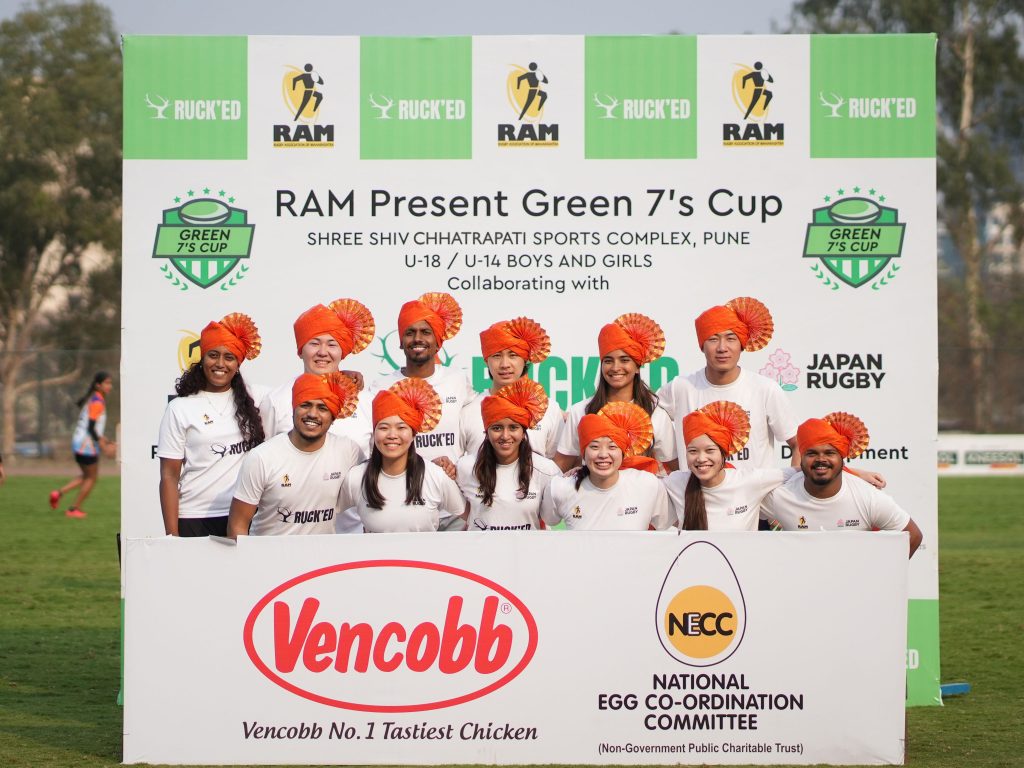
4.RUCK’ed program in India: leadership lecture
In this program, including the previous online session, we not only learned leadership, there were many sessions to understand ourselves. We had to think some themes that we did not think in our daily life. This program provided us with opportunities to develop values, thinking habits and style of leadership.
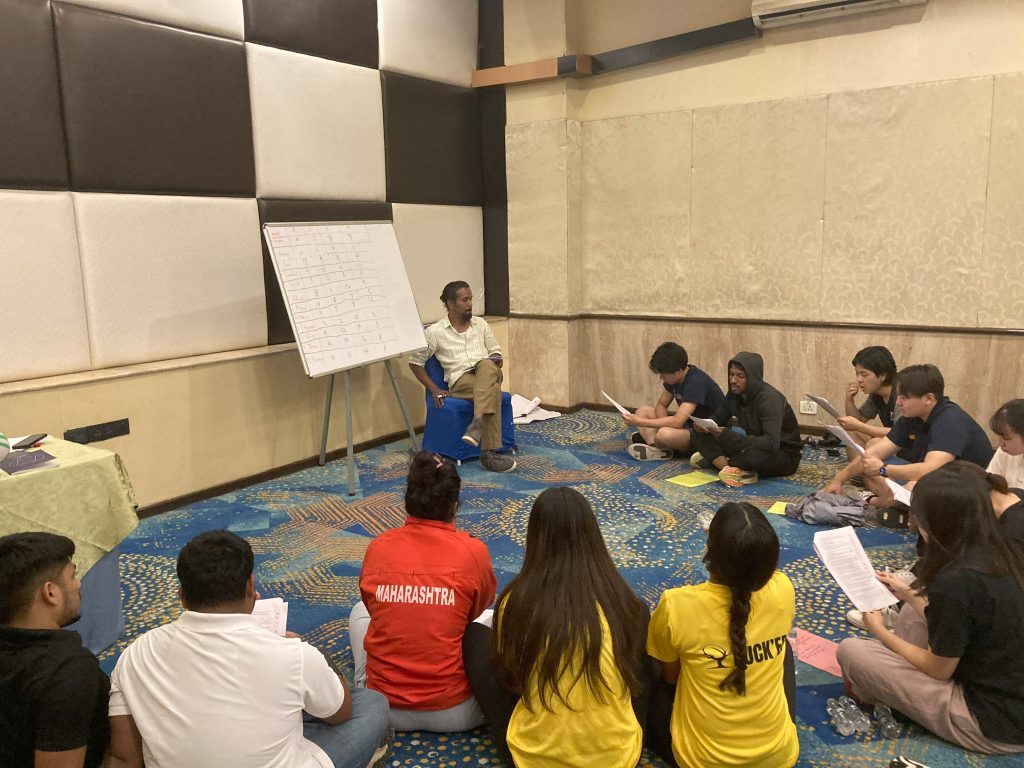
–Learning leadership
We felt the meaning of leadership: leadership is taking the lead or supporting others, or there is another meaning. We felt various leadership through many activities. In addition to that, we did not merely learn the leadership theories; we could grope them, which will fit us.
– Sharing TAVTA
“TATVA” is a way of approach to estimating oneself, solving problems and making long-term vision clear. In this session, we faced unfamiliar themes and we could look into our inner self, which helped us to verbalize our thoughts.
–Iceberg Model
People cannot see a whole iceberg because most of it is under the sea. Similarly, invisible factors exist in our values and actions. The iceberg model helped us identify problems that we will tackle after the Ruked’ed program in India.
–Self-reflection
We had time to share our feelings and thoughts that we had learned from every session. Additionally, we reviewed the day before the session in the morning. Repeating this routine developed our capacity to express our ideas and establish learning styles. We realized that we have to think about what we feel and it is important to improve. This self-reflection time improved our capacity to express opinions in English. Firstly, we could not speak English well and we lost our confidence in English. However, speaking English every day eliminated obstacles to sharing ideas in English actively. Finally, we felt that perfect English is not necessary, attitude to express is important.(I
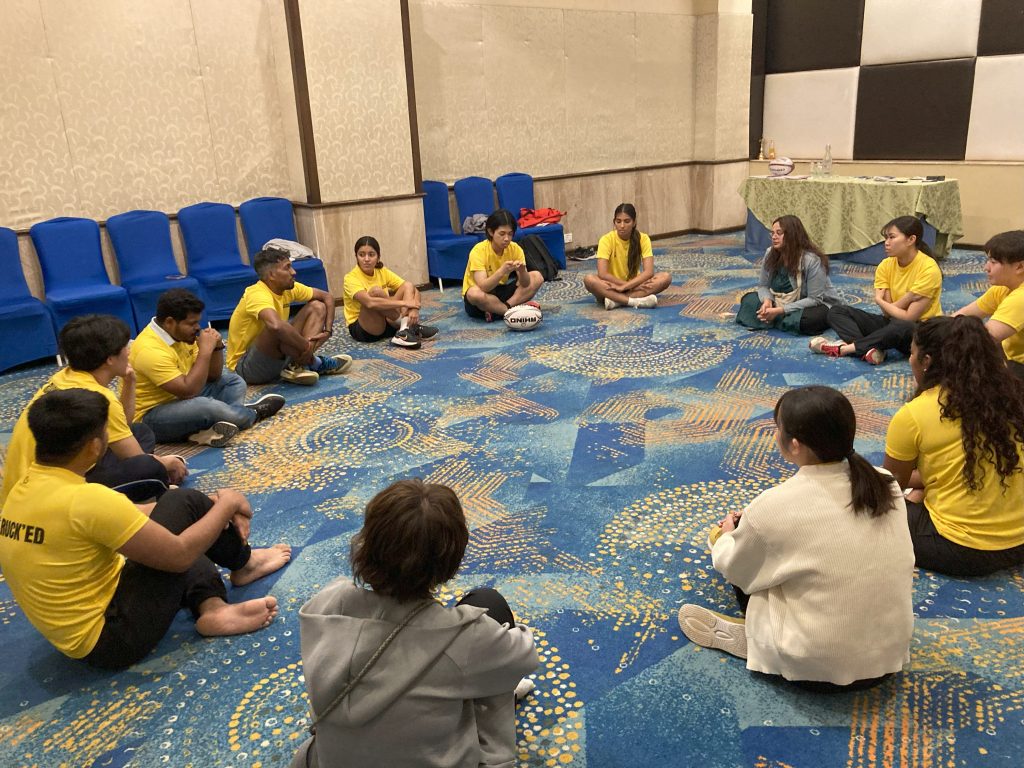
-Personal development
We took advantage of the Iceberg Model to brush up on personal projects that we wanted to do after this project. Although the time to think myself is important, sharing ideas and getting feedback from others are also important to get objective views and new ideas. In addition to that, understanding others’ awareness of problems and approaches broadened the mind and helped us draw concrete action plans.
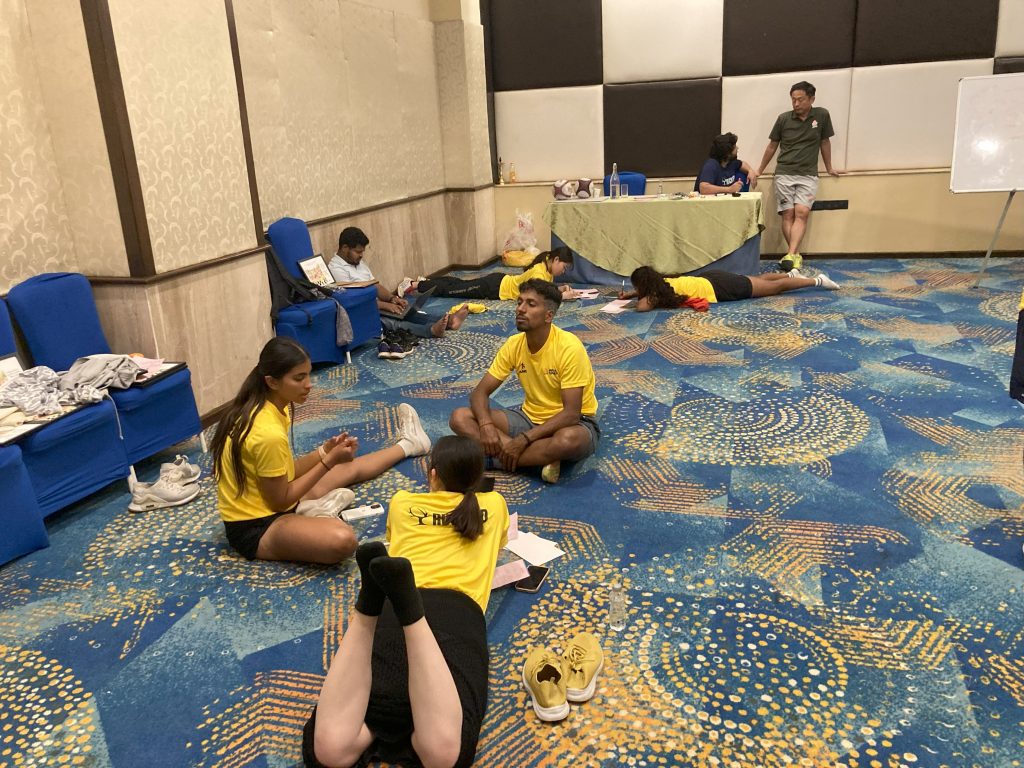
-Team Building
We had to get out of a maze without communication in a team and across a river as team building activity games, we could learn the importance of communication, which does not rely on words through the above activities. Especially, the process of finding a role in a team was interesting. We felt there are many types of leaders such as standing in front of a team or observing others to coordinate etc. We realized that each different strong point should be respected to work well as a team.
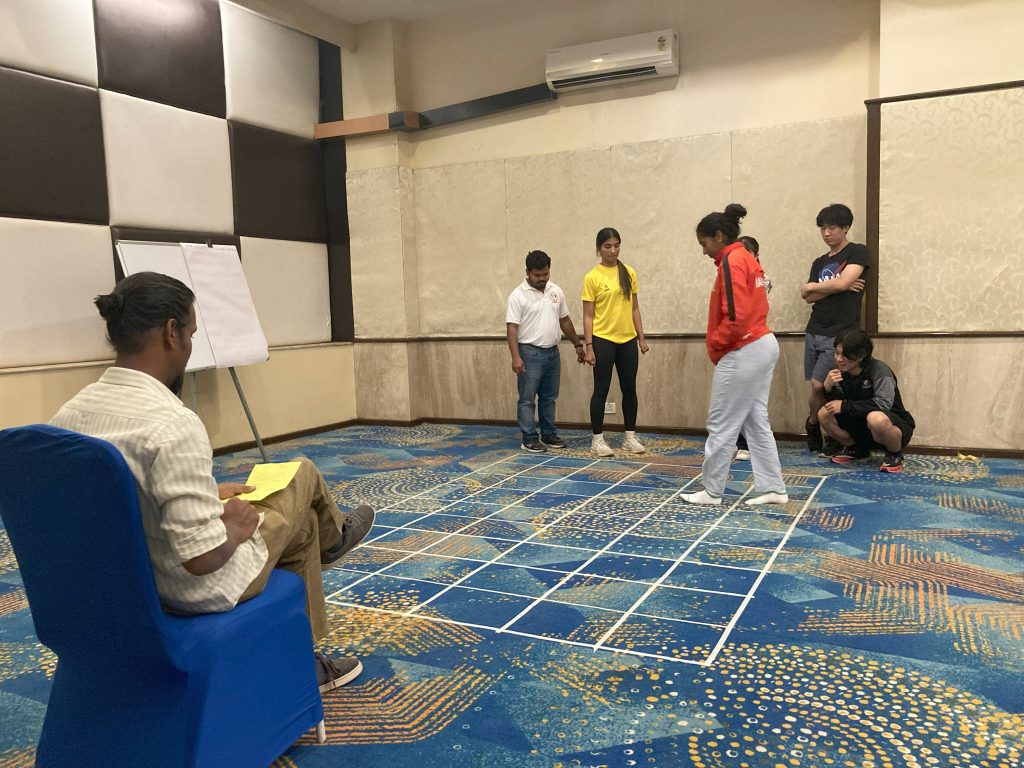
-Voice from the participants
“I sometimes felt helpless while thinking about a personal project, a small thing that I can do will be related to the future and it is important for me to keep it in my mind.”
“I learned new views about leadership and communication through team building without verbal communication.”
5.RUCK’ed program in India: Study of Environmental Issues
In India, we learned about efforts to tackle environmental issues by visiting local NGOs that have conducted and how to develop grassroots projects. We developed our activation plans for Green 7’s Cup and tried to collaborate with new stakeholders to extend our social impacts.
Visit to NGO Vasuandhara Abhiyan Baner (experience of planting trees)
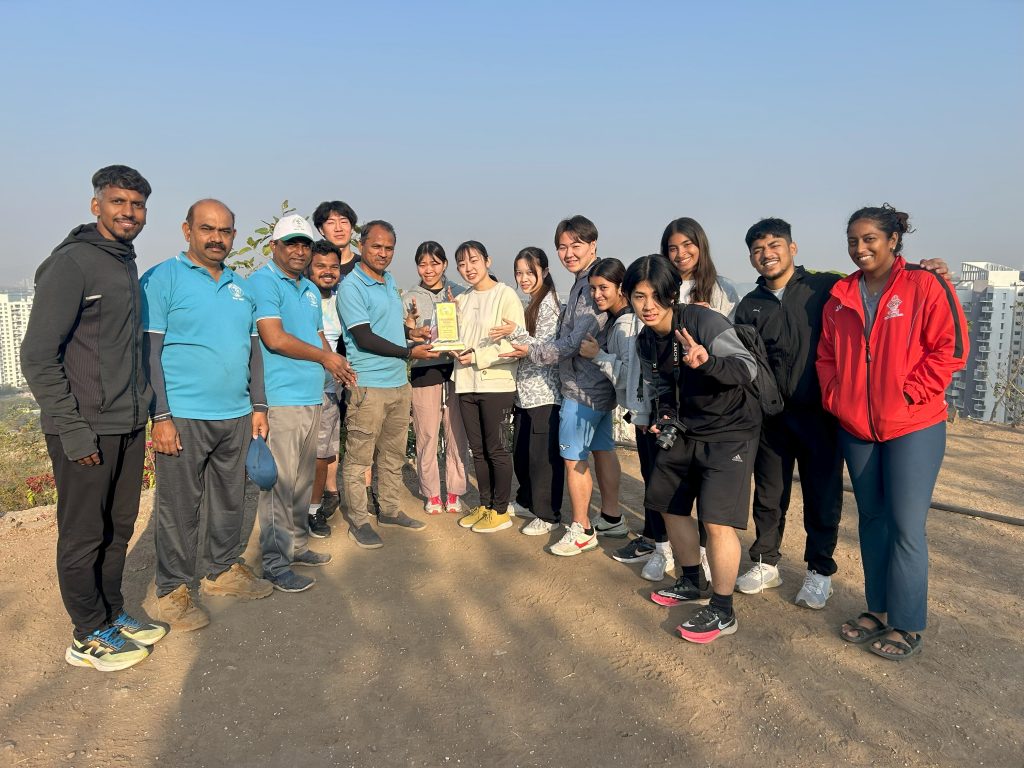
This NGO tackles environmental issues on Baner-Pashan Hill in the suburb of Pune with a plating campaign. In the past, there was a crisis of deforestation due to large-scale digging. However, their movement stopped this expansion, said the co-founder. Thanks to their work for over 20 years, the hill has recovered, but there was originally no plant. We learned how to plant and keep them and what impacts they have. Particularly, this visit raised awareness of Japanese participants about the difficulties in planting because Japan has a high percentage of forests and it is normal for them. Indeed, we got involved in the planting campaign and our activations for Green 7’s Cup are small steps but working on a small thing continuously will contribute to society. This visit provided us with opportunities to rethink our activations for Green 7’s Cup.
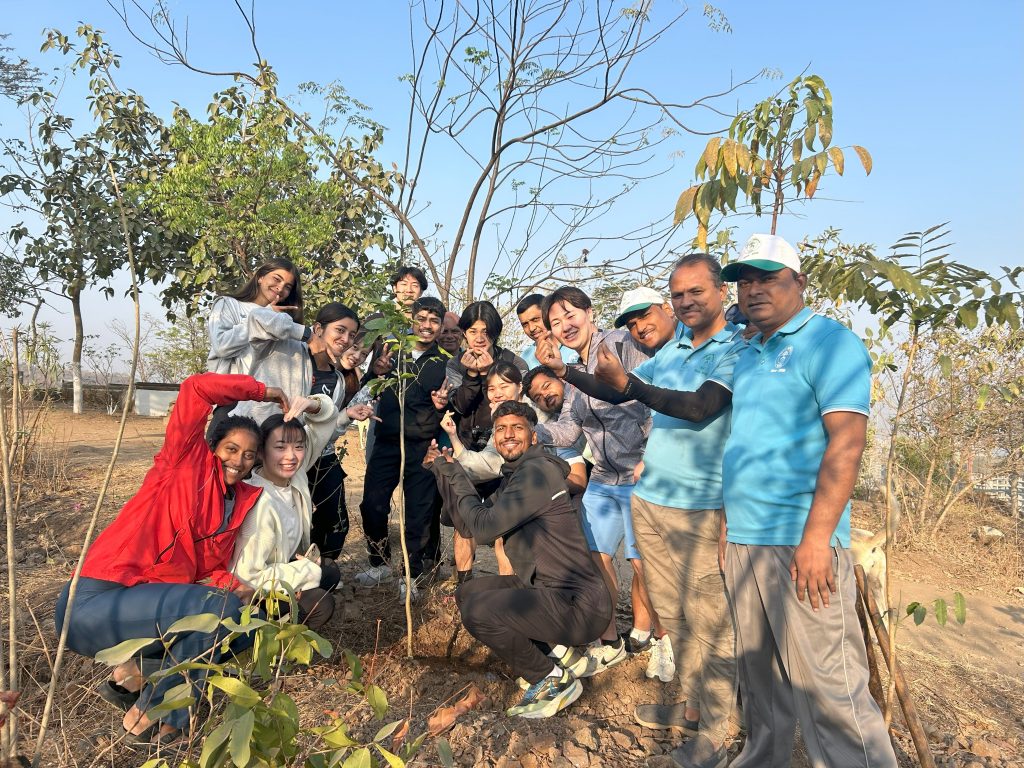
Visit to Protection Ecological Foundation (Eco-friendly Farm)
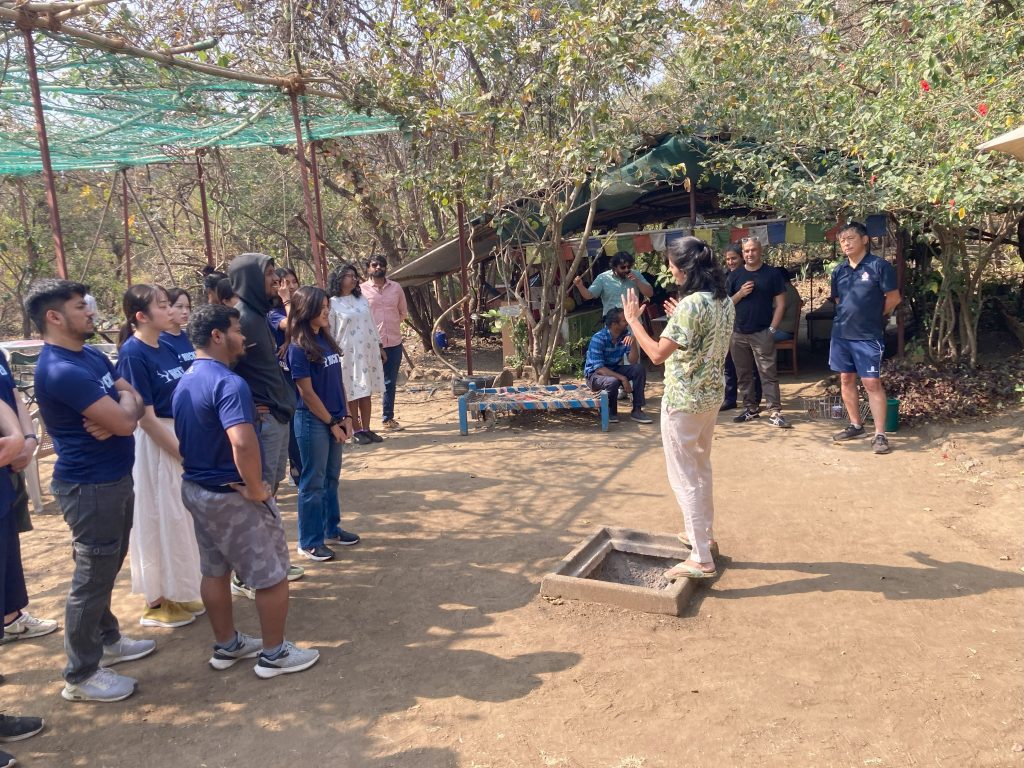
We visited an NGO that works to harmonize nature and solve environmental issues by educating people. Pooja (Founder of this NGO) gave us concrete ways to approach our targets as a part of preparation. After this visit, we immediately discussed our ideas there to combine our ideas and the experience on the farm.
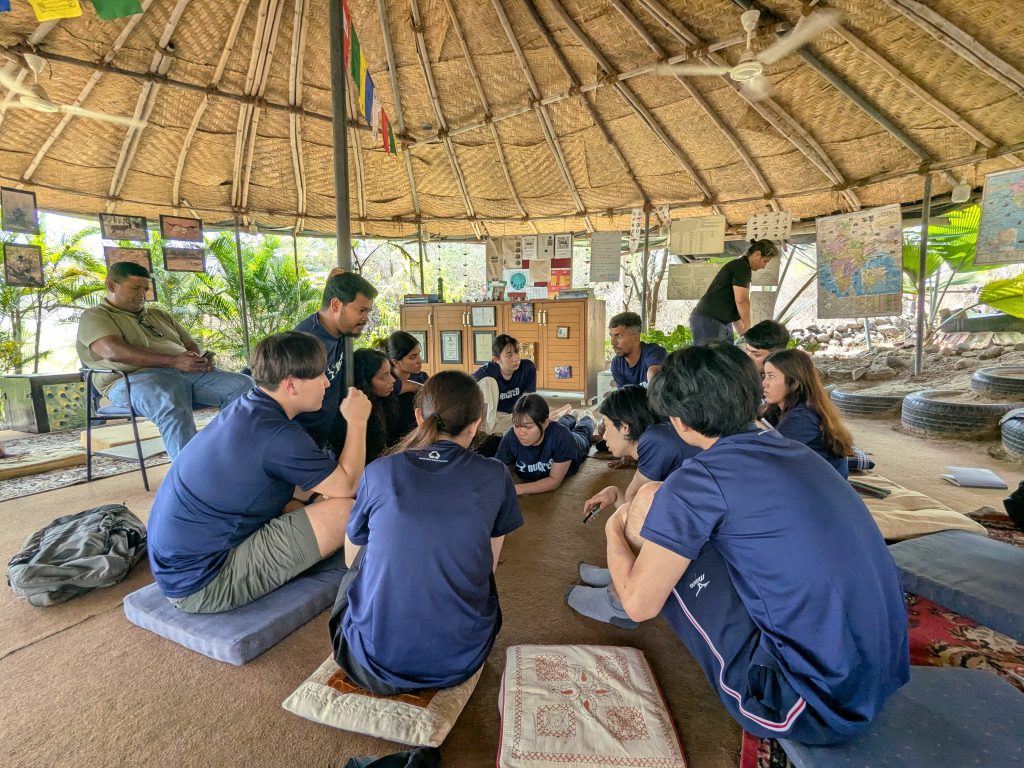
-Voice from the participants
“Although they plant trees cows probably eat planted trees, I felt it was like a dilemma and it was a part of the difficulties. ”
“I learned the value of grassroots projects, which made me sure about my project.”
6. RUCK’ed program in India: Green 7’s Cup
We tried to tackle environmental issues through Green 7’s Cup based on leadership lectures and studies about environmental issues that we had learned. This rugby tournament consisted of the morning and the evening parts. In the morning young generation (U14/male and female) enjoyed touch rugby. In the evening, rugby players (adult/male and female) enjoyed sevens rugby.
-Green 7’s Cup Planning
Before staying in India, we were divided into two teams; the PR team and the Sustainable team. PR team thought of ideas to encourage this tournament via social media. On the other hand, the Sustainable team thought about how they would raise participants’ awareness of environmental issues to learn. After arriving in India, we discussed concretely to finalize our ideas.
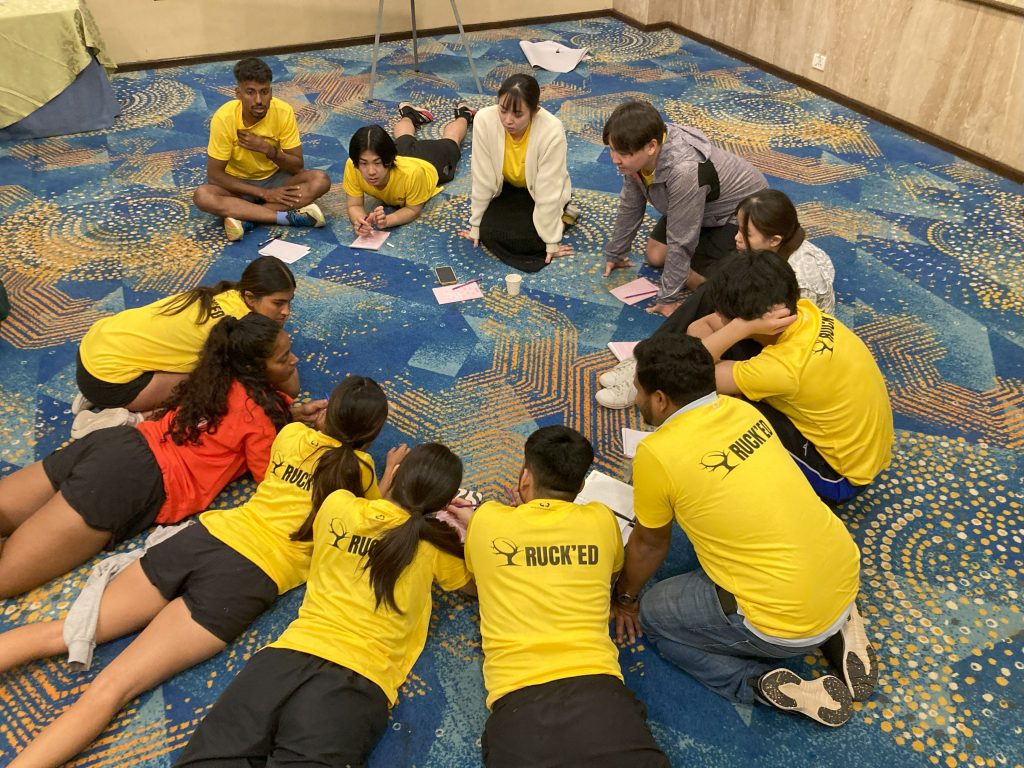
Action Plan for Green 7’s Cup
On the day of the tournament, we decided to address environmental issues through the following four main initiatives. ①Providing environmentally friendly meals
②Setting up garbage stations
③Garbage exhibition
④ Games
Through these initiatives, we aimed to help participants feel more connected to environmental issues. Additionally, we planned to share information about the event’s overview, objectives, and the day’s matches through social media. Furthermore, as a synergistic effort, we collaborated with the NGO Vasundhara Abhiyan Baner, which we visited during the program period. This collaboration involved planting trees corresponding to the number of tries recorded during the event.
What we did on the day and how it went
1.Providing meals by using recyclable Colortry
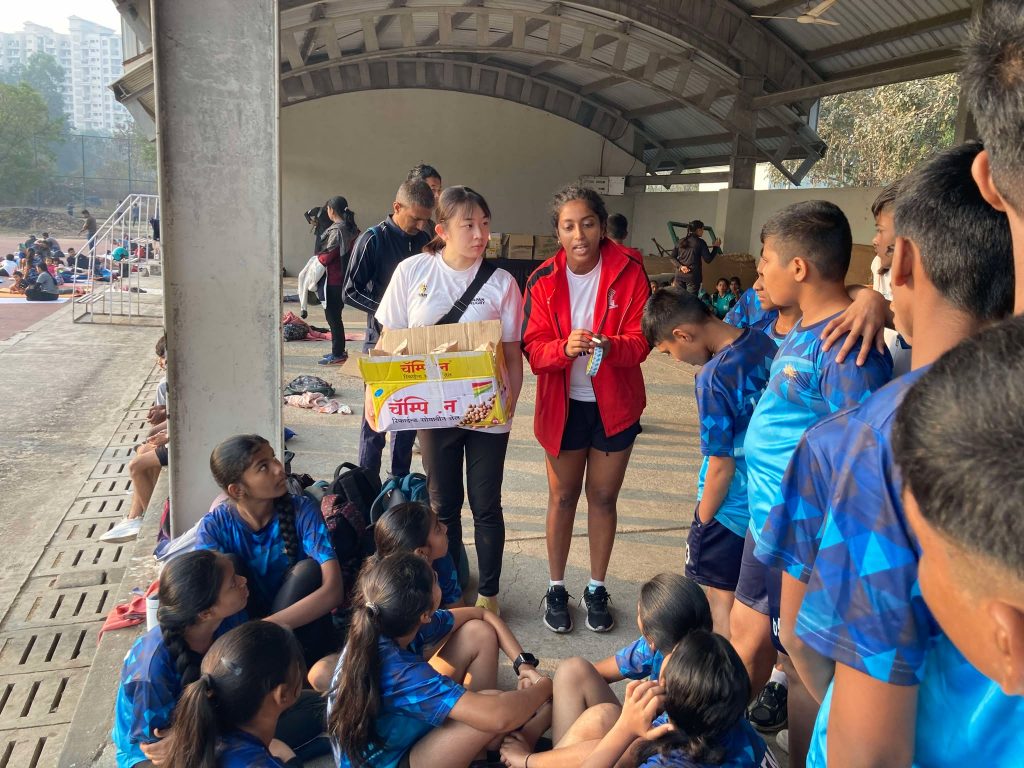
We did not use plastic to provide meals and also we used stainless tableware to reduce the amount of waste.
2.Setting garbage collect Station
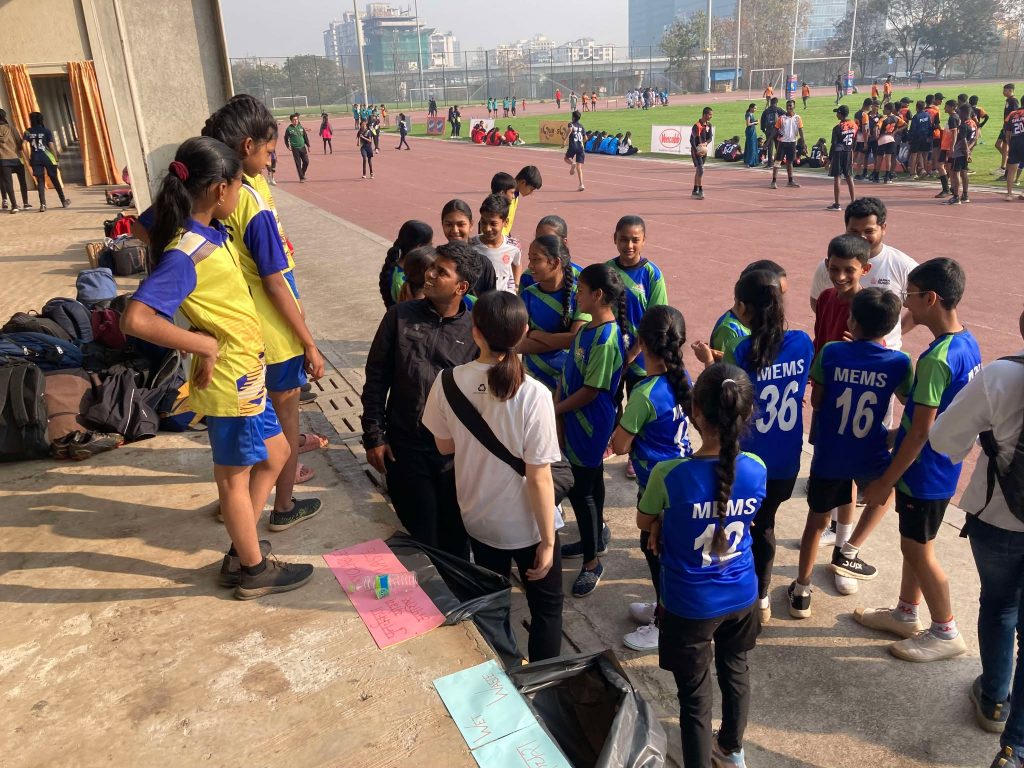
We set the garbage collect station to sort garbage into dry waste, wet waste, plastic waste, and plastic bottles. Initially, we were thinking that we would have three types of garbage collect station.
However, we decided to separate plastic bottles from plastic waste to further understand. We separated them according to the criteria with children and explained how to sort garbage out. At the end of the tournament, we carried them to an NGO that would recycle. This initiative was the first time for the Rugby Association of Maharashtra (RAM) but this idea reached the stage of realization thanks to lectures and study in India.
We did not use plastic to provide meals and also we used stainless tableware to reduce the amount of waste. We set the garbage dumps to sort garbage into dry waste, wet waste, plastic waste, and plastic bottles. Initially, we were thinking that we would have three types of garbage dumps. However, we decided to separate plastic bottles from plastic waste to further understand. We separated them according to the criteria with children and explained how to sort garbage out. At the end of the tournament, we carried them to an NGO that would recycle. This initiative was the first time for the Rugby Association of Maharashtra (RAM) but this idea reached the stage of realization thanks to lectures and study in India.
3.Showing periods to decompose
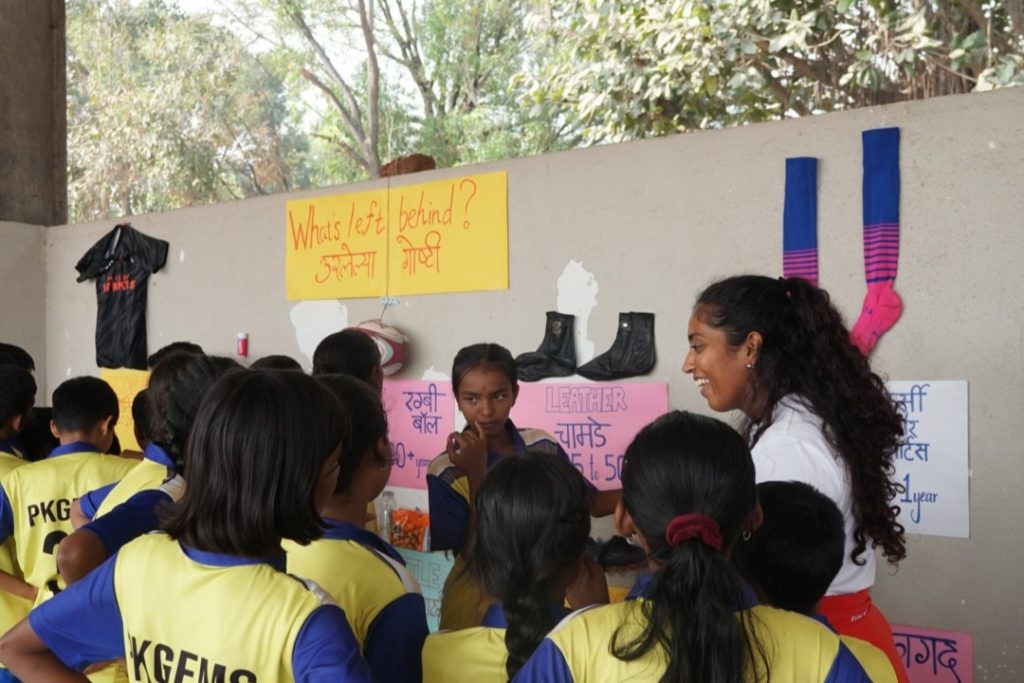
We displayed how many years garbage needs to be in the soil for decomposition. In addition to that, the Sustainable team explained the details to children directly to further understand.
4.Organizing a garbage game
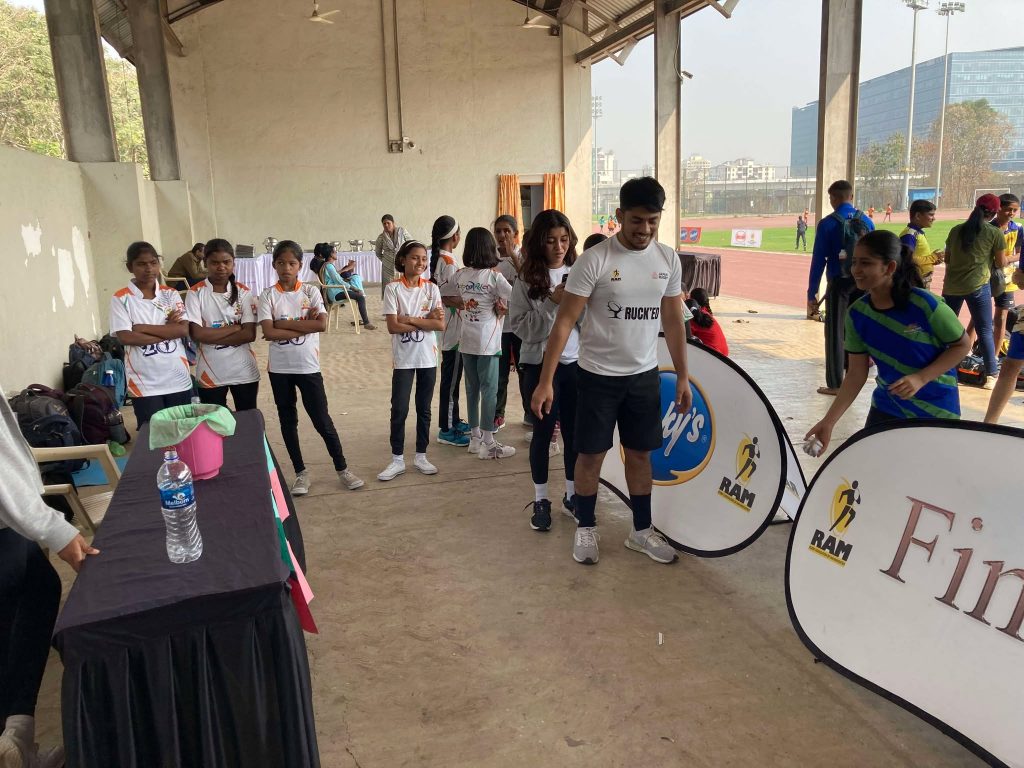
We prepared a ball and trash bin as a game. Participants could throw the ball into the trash bin. If it succeeded, they were asked a question from the decomposition exhibition. We hoped that this game would help children think about consumption well again. Fortunately, this game became popular and they enjoyed it.
7. RUCK’ed program in India: After Green 7’s Cup
We feel this program in India is hard but very intensive due to the one week in which we could develop our personalities and learn about environmental issues. On the day of the tournament, we could see the participants enjoying our activities.From now on, we will think about how we take advantage of this experience for our personal projects
Voice of Participants
“Self-reflection every day developed our abilities, especially our English. Initially, we had not spoken English with confidence but expressing ideas actively improved our minds; Perfect English is not necessary, trying to speak English is more important. “
“Through the program, we learned the importance of concrete action against the environmental issues. On the day of Green 7’s Cup, we showed sustainable and practical ways to tackle the environmental issues through our ideas.”
“We felt that the environment connects with us physically and psychologically. We think having a space in which there is no perfect answer can help us to solve problems. We thought what we could contribute to, this experience taught me the enjoyment of contribution to the community, even if the community is small.”
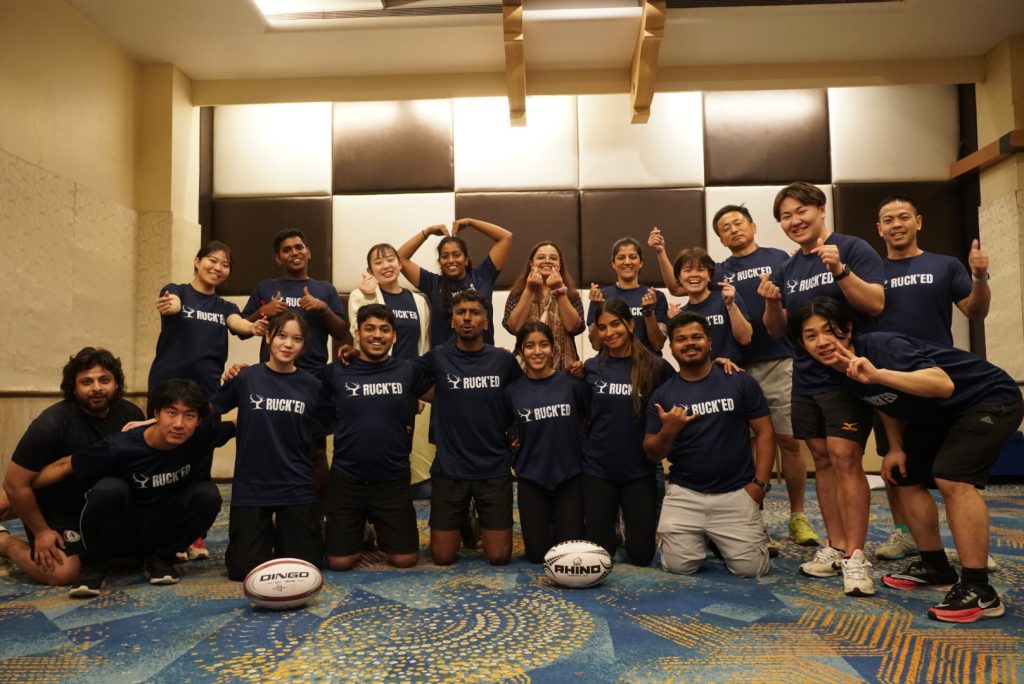
Youth Leadership Program “RUCK’ed” has been conducted by the Japan Rugby Football Union (JRFU) with collaboration with Rugby Association of Maharashtra in India.
From June 23 to July 1, 2025, two participants;Ruchi Shetty (a player from Women’s Maharashtra Representative Team) and Pankajkumar Singh (a staff member of the Maharashtra Rugby Association), visited Japan to learn about the promotion of rugby in Japan, as well as using rugby for social good such as community-building and urban development.
8. Japan Visit
From June 23 to July 1, 2025, two participants;Ruchi Shetty (a player from Women’s Maharashtra Representative Team) and Pankajkumar Singh (a staff member of the Maharashtra Rugby Association), visited Japan to learn about the promotion of rugby in Japan, as well as using rugby for social good such as community-building and urban development.
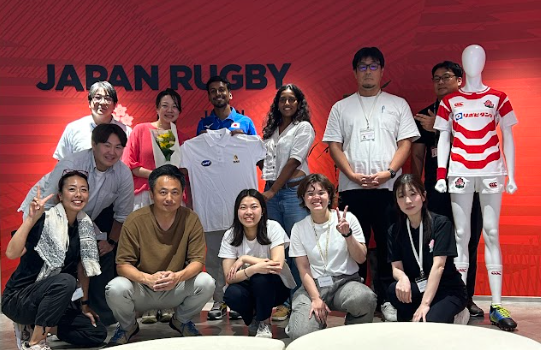
Day 1
Visited the Hyogo Rugby Football Union, learned about their mid-term strategies and activities for rugby promotion and development, then participated in a Tag Rugby in English session.
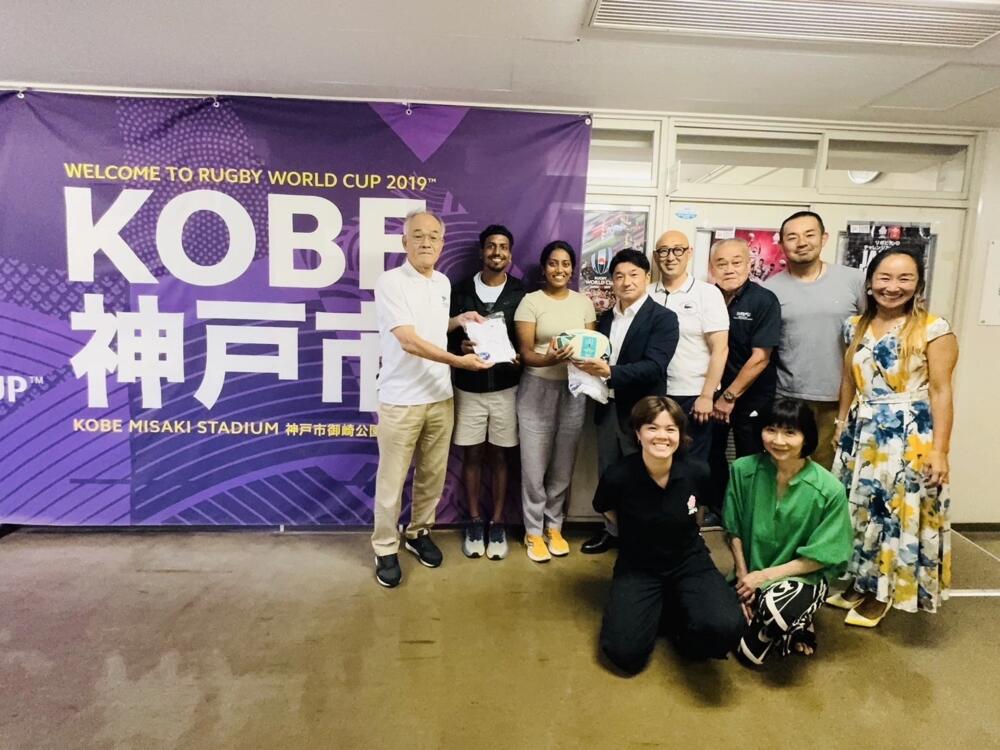
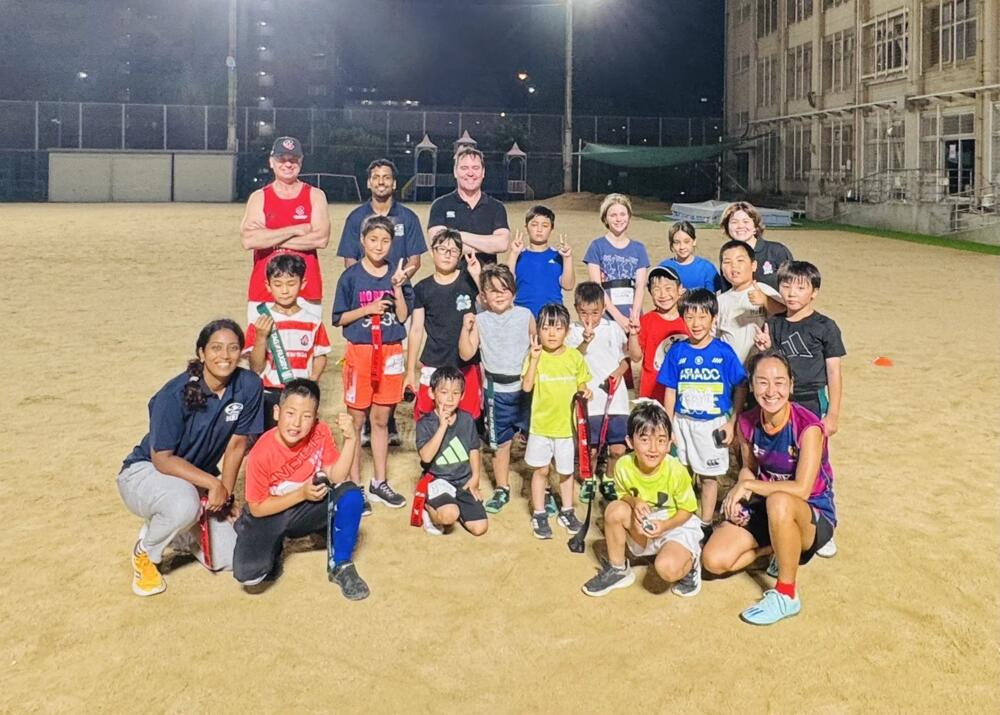
“While touch rugby is predominant in India, witnessing Japan’s rugby classes made us realize that tag rugby has enormous potential for widespread adoption and growth.”
Day 2
Higashi Osaka City’s efforts to build a community and realize a coexisting society through rugby
On the second day, participated in a tag rugby session at Kusunoki Kodomo En (nursery school). The focus was enjoying rugby rather than skills development.
Later, moved to Hanazono Rugby Stadium in Higashi-Osaka City, where they learned about city promotion, community-building through rugby and efforts toward a society of coexistence through sports in city’s policy and planning of Higashi-Osaka City.
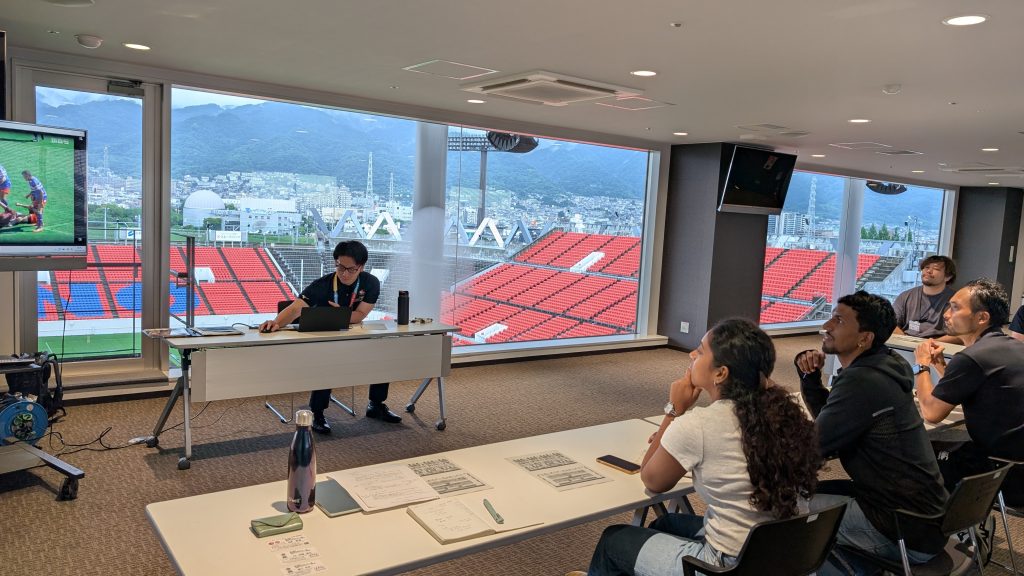
“We felt the importance of working together with various groups such as local governments, communities, and companies. It’s essential to collaborate not only with rugby-related organizations but also with organizations that share a common vision. “
“From organizing tournaments to local initiatives like “Rugby City” and community engagement, we felt that rugby in Japan is more than just a sport—it’s an integral part of society.”
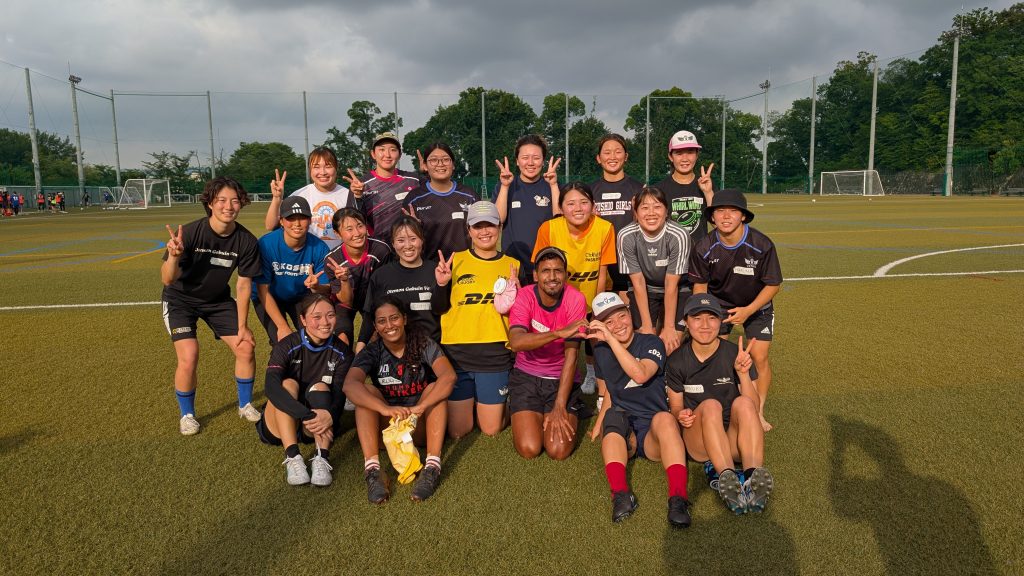
Day 3
Visiting League One “Black Rams Tokyo”
We moved to Tokyo and heard about the Black Rams Tokyo’s local initiatives and team management.
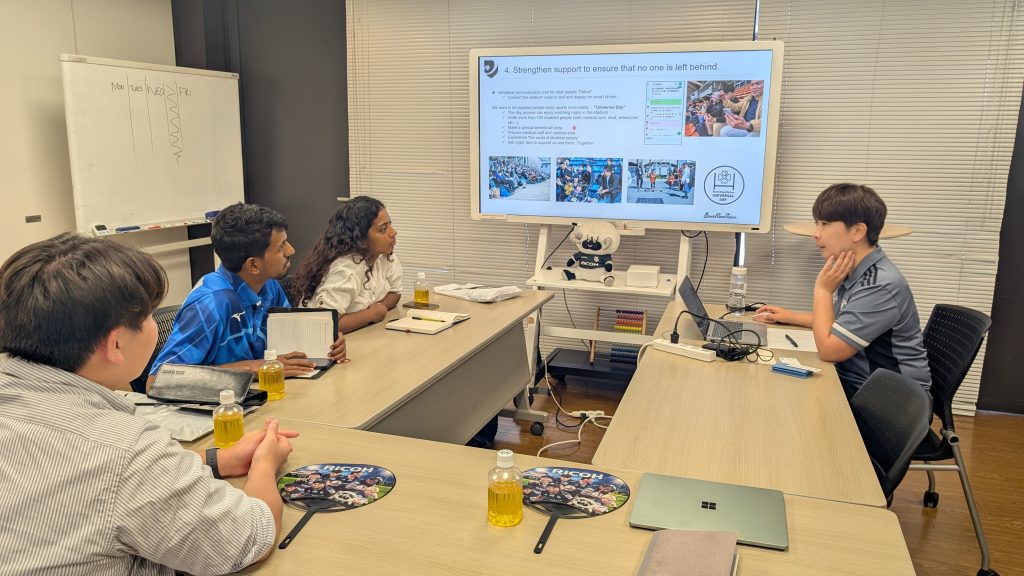
“ We learned that Japan’s rugby has been continuously supported through community activities even when it was not as popular. And dots are connected when the national team started playing well in international competitions and hosted the Rugby World Cup successfully. Although rugby remains a minor sport in India now, we understand the importance of preparation and ongoing efforts. “
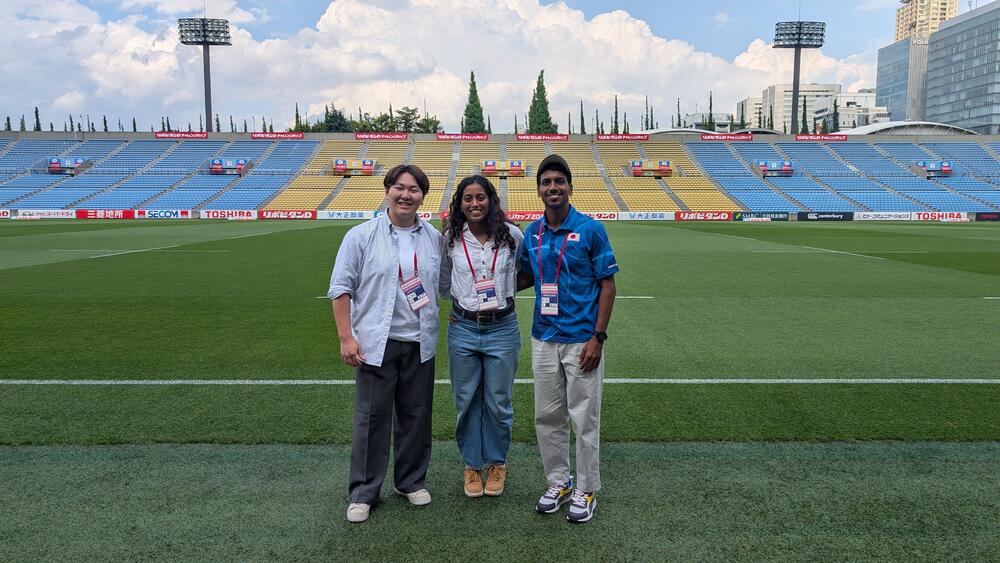
Later, visited Prince Chichibu Memorial Rugby Stadium for Lipovitan D Challenge Cup2025 venue tour, and had meeting with Japan Rugby Football Union.
They shared their ongoing activities in India and shared what they learned in Japan.
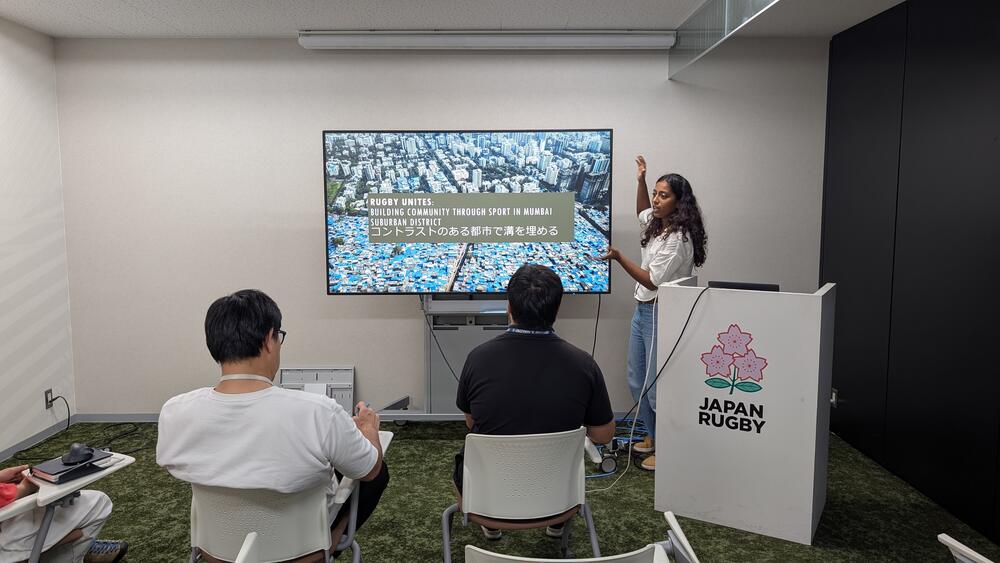
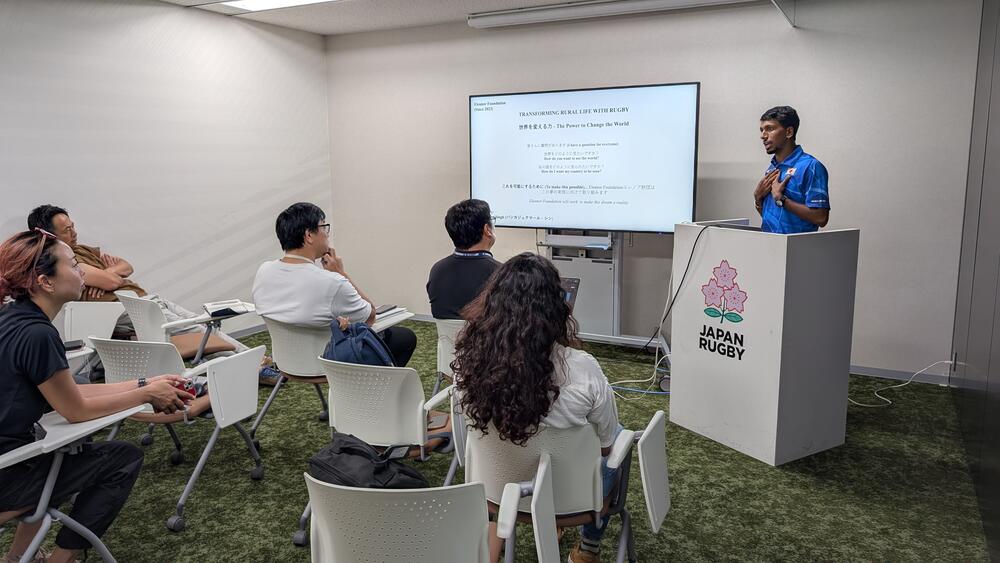
Day 4
Visiting League One “Black Rams Tokyo”
Met with Professor Taku Yamaguchi from Tsukuba University to exchange ideas from an academic perspective about sports and social development, emphasizing the importance of diverse inputs for program designing and implementation.
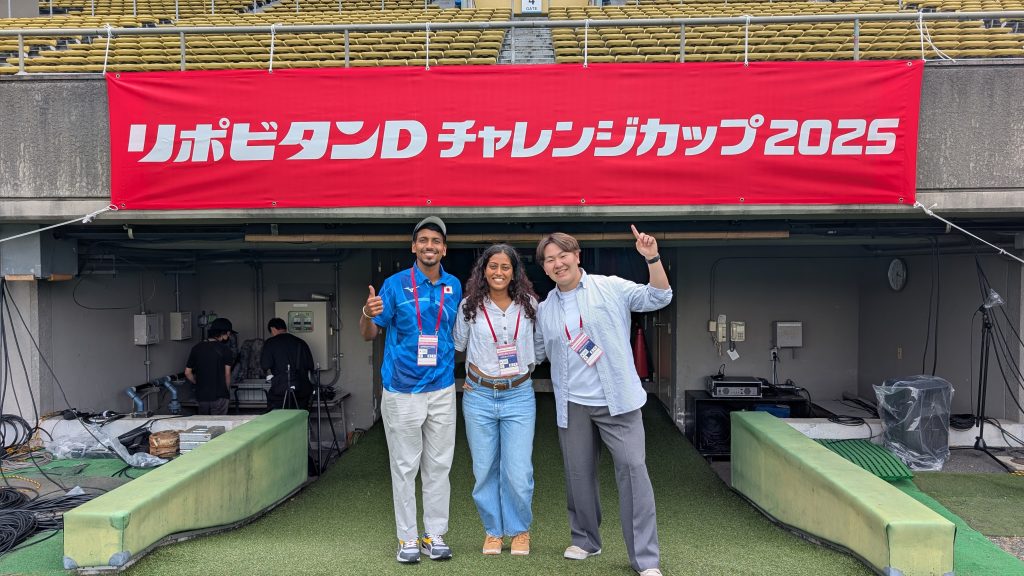
Afterward, watched the Lipovitan D Challenge Cup 2025 JAPAN XV vs Māori All Blacks.
“We learned a lot about Japan’s meticulous tournament organization—from detailed preparations to precise on-the-day operations. Documenting activities and seeking feedback for continuous improvement is very important. (Watching the JAPAN XV vs. Māori All Blacks match at the venue was truly breathtaking!) “
Day 5
Moved back to Kansai and watched the Kansai Mini Rugby Jamboree exchange tournament and Kansai Rugby Football Union 100th anniversary match; East-West University Game.
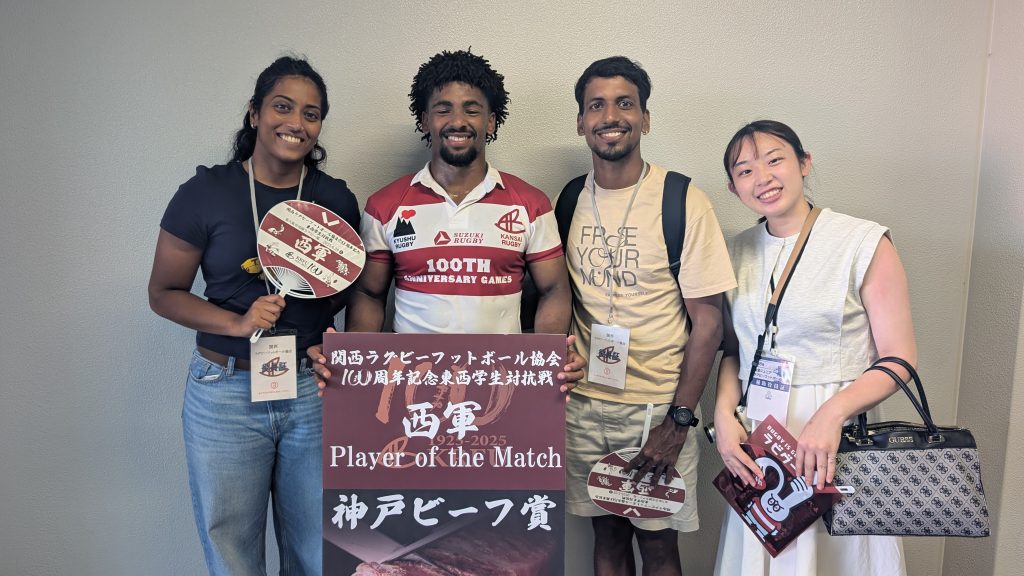
Enjoyed the vibrant atmosphere of different rugby categories in Japan and learnt difference in event operations for different categories.
Day 6
On the last day, visited Shimadzu Corporation to learn their rugby team Shimazu Breakers and their community initiatives
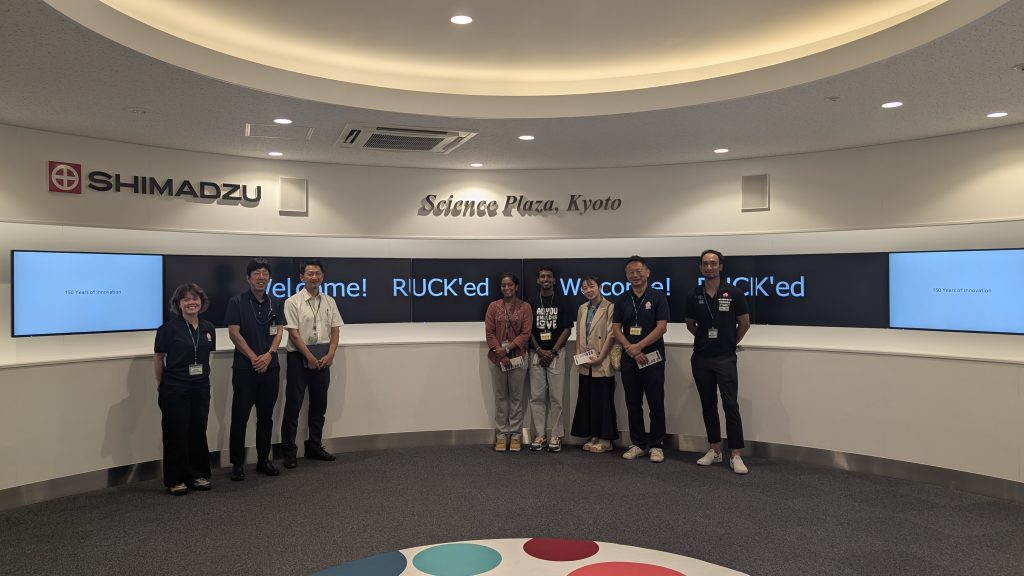
We held a last meeting to summarize their activities in Japan, shared lessons learned, and discussed future efforts to promote rugby and develop activities in Maharashtra, India.
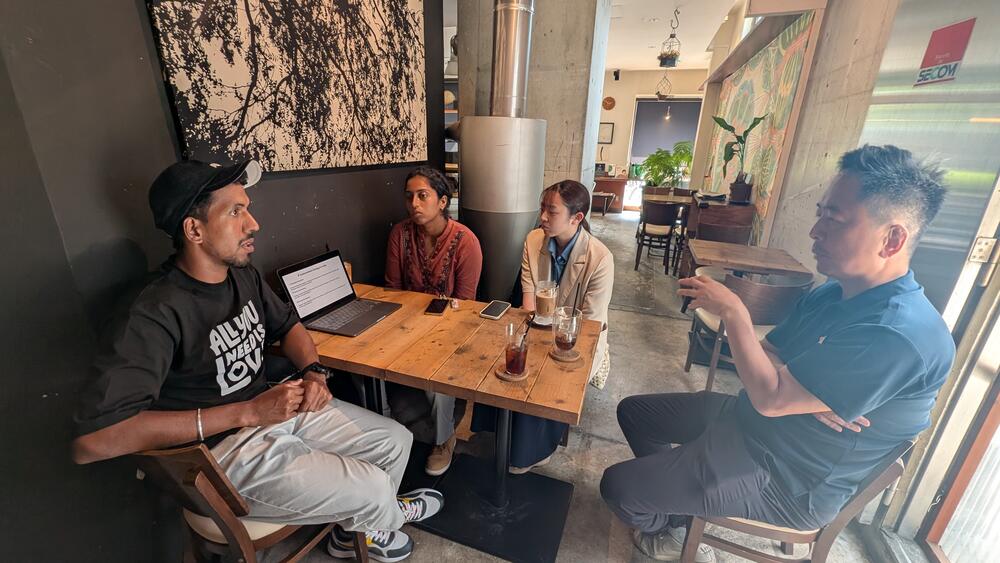
For the Future
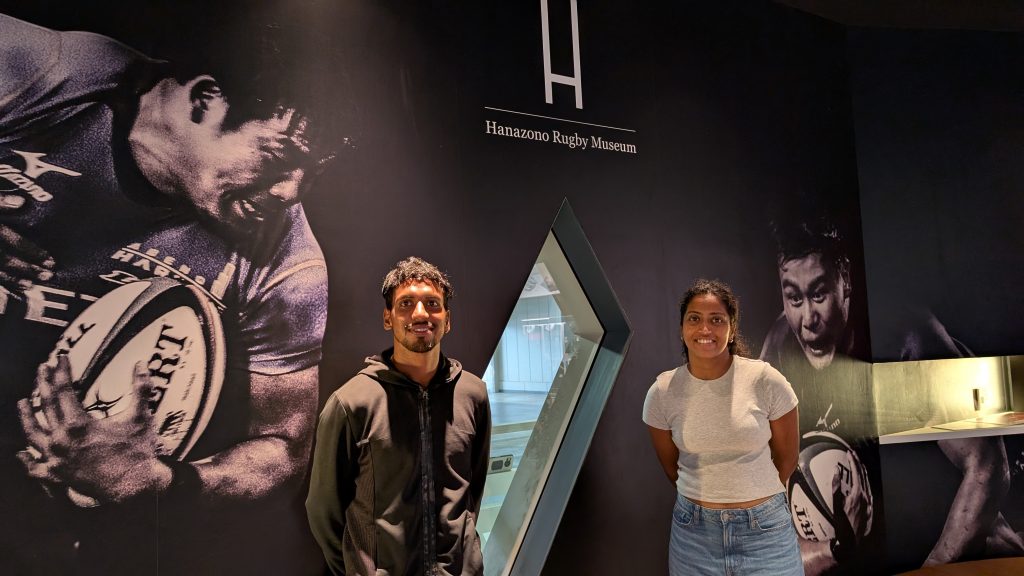
“Building on what we learned, we aim to promote tag rugby further, deepen our understanding of corporate and government frameworks, and collaborate with various organizations, including local governments, to expand rugby in Maharashtra, India. We’ve learned that rugby is not just a sport but also a culture, and we want to help create that culture in India, too.”
Thank you very much to everyone we had the opportunity to meet during our visit!
After returning to India, out youth leaders will continue our efforts to promote rugby and create a better society through rugby.